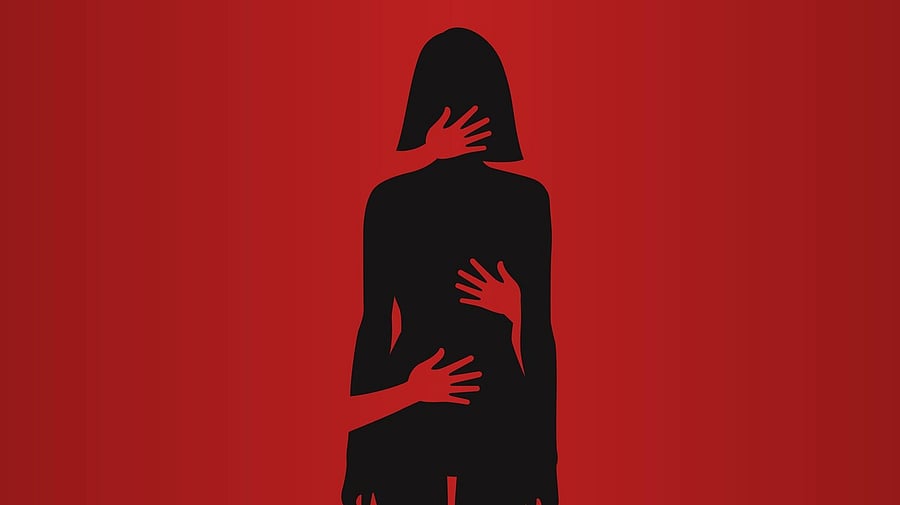
Illustration for representational purposes.
Credit: iStock Photo
Since the Hema committee report was released to the public in August last year, discussions on the need for internal complaints committees to address sexual harassment in cinema, art, and theatre spaces have intensified.
Even before this, in 2017, when the #MeToo movement gained momentum, it empowered many women from various sectors to call out their tormentors, exposing the vulnerability of women in their workplaces. But what happens to these victims after they speak up?
While PoSH (prevention of sexual harassment) committees are mandatory in workplaces, concerns remain about women working in informal sectors like cinema and theatre. In September, the Karnataka State Women’s Commission directed the Karnataka Film Chamber of Commerce to create an internal complaints committee to address sexual harassment in the Kannada film industry.
How different is theatre from cinema? It is an open secret that young girls and women are exploited in theatre spaces. Just as the casting couch is a reality in cinema, women in theatre also face exploitation and compromise to gain opportunities. Theatre, after all, remains a stepping stone to cinema.
“Exploitation is present in theatre as much as it is in cinema,” says Vijayamma, senior journalist, theatre critic, and women’s rights activist.
There is always resistance when such issues are addressed. Even when the women’s commission directed the KFCC to form a committee, endless debates followed, with some in the industry claiming it was unnecessary and boasting about the “sanctity” and “purity” of the film industry. If that were true, then why the reluctance?
“In spaces like theatre, where there is a lot of creative freedom and liberty, it is also important for women to feel safe. There is a small delta of temptation that can become something else. If it is not a wilful arrangement, women must have redressal systems within the creative framework. It is imperative—and a sign of maturity—as
we go forward,” says theatre artiste and senior journalist Preethi Nagaraj.
Harassment and sexual misconduct take many forms—unwanted touching, vulgar jokes, sexual innuendos, and advances. Chitra Venkatraju, a well-known theatre artiste, recalls an incident from a decade ago when a prominent film star with a theatre background sent her vulgar messages. “I filed a police complaint against him. The cops told me an FIR wasn’t necessary and that they would warn him. He later apologised, but it didn’t end there. It backfired. A word spread that I’m a problematic person,” she shares.
In most sexual harassment cases and even rape cases, the victim is often further victimised. Many #MeToo cases have shown this—actors lost work because they spoke out against influential directors or stars. Many theatre practitioners say that women who speak out about harassment, women’s rights, and feminism are often excluded from mainstream discussions and opportunities within the theatre community. “Although the #MeToo movement empowered some women, many remain silent out of fear of victim shaming,” says theatre practitioner Rajani Garud.
Theatre director Sharanya Ramprakash shares, “There is no way to report the kind of abuse that happens in theatre spaces, and they remain within whisper networks.”
She emphasises the need for a body to prevent such cases,
and it must begin with theatres and troupes themselves constituting an IC; these must be local and regional.
Do theatre troupes have internal committees? How do they address these issues? “At a team level, some troupes address these concerns, but they find it difficult because there will always be someone who wouldn’t want this to occur. And these may coincidentally be men who are running these theatre troupes,” says Preethi.
In the absence of clear guidelines or, more importantly, a strong support system, theatre troupes struggle to address these issues. As Sharanya points out, cases often remain whispers until they die down.
Some theatre practitioners suggest forming think tanks to develop redressal mechanisms, human rights groups, or having the Karnataka Nataka Academy step in to form a committee.
Karnataka’s theatre community is scattered across the state, including rural and remote areas, with many amateur and loosely organised groups. Exploitation can take different forms—amateur groups invite directors to direct plays or conduct workshops. Theatre spaces are intimate, with performers working closely and rehearsing for days. Directors also often travel with the troupe. Given these situations, how safe have these creative spaces been or will be going forward?